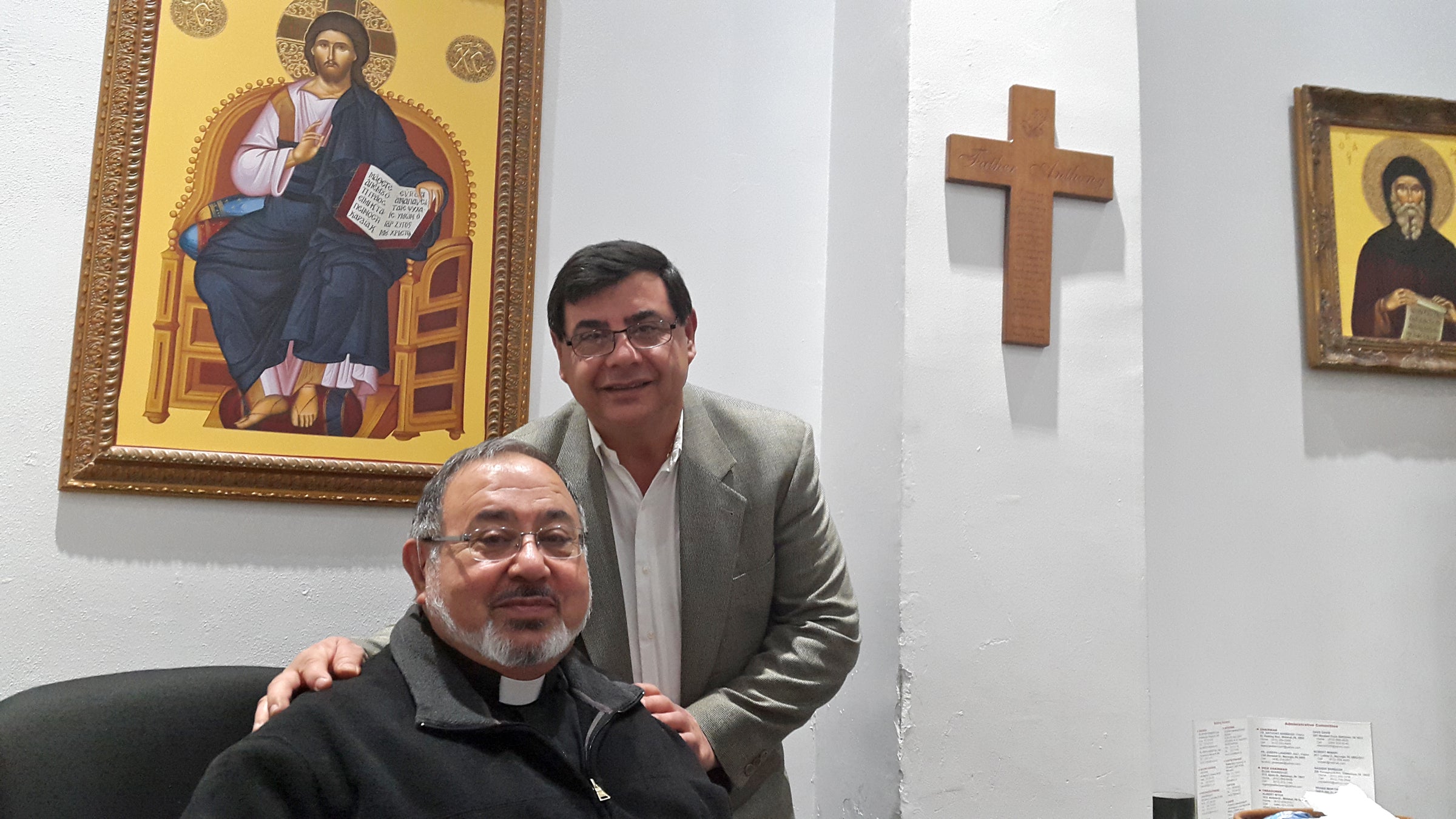Lehigh Valley ponders welcoming more Syrian refugees
Listen
The Rev. Anthony Sabbagh and his brother Nasser Sabbagh work at St. George Antiochian Orthodox Church in Allentown, a Syrian Christian church founded in 1916. The church is providing aid to Syrian refugees in the Lehigh Valley and in Syria. (Laura Benshoff/WHYY)
Farouk leans forward at the interview table, hands clasped. The question, what do you miss in Syria, gets a one word answer.
“Everything,” he said.
Farouk — not his real name — doesn’t want to be identified for fear of retribution back in Syria. He’s one of 138 Syrian refugees to arrive in Allentown since civil war began splintering his country.
The Lehigh Valley has a large historic Syrian community, boasting more Syrians per capita than any other city in America, and that density is part of what makes it an attractive place to resettle Syrian refugees.
Following attacks in Baghdad, Beirut, and Paris last week, some local and national political leaders want to end offering Syrians refugee status in the U.S., until the vetting process can be further refined. That position met, alternately, with confusion, anger and satisfaction from Allentown residents.
“I still would say, proceed with caution,” said Radwan Jarrouj, a member of Allentown’s longstanding Syrian community and treasurer with the Syrian Arab American Cultural Association in the city’s 6th Ward.
Even though he lobbied for Allentown to accept Syrian refugee, Jarrouj said he empathizes with politicians — including like New Jersey Gov. Chris Christie — who have grown anxious over accepting more.
“I remember Sept. 11 … I understand his anxiety,” Jarrouj said.
That anxiety, shared by U.S. Sen. Pat Toomey and U.S. Rep. Charlie Dent, is that ISIS could manipulate the refugee program to admit terrorists to the United States.
In a video statement earlier this week, Toomey spelled out his fears. “There is no way of reliably vetting people that come from these chaotic terrorist havens.”
That statement is up for debate. Members of the refugee resettlement community, and refugees themselves, vouch for the thoroughness of the background checks, which take about two years to complete.
“Part of the processing involves, multiple security clearances including name checks [and] fingerprints,” said Janet Panning, program director with Lutheran Children and Family Services. Intelligence agencies take that biometric information and cross-reference it with databases of known terrorists.
Since the start of the war, about 2,000 refugees have cleared that bar.
Thursday, the U.S. House passed a measure to suspend the process until security checks can be tightened. Dent voted for the bill.
31 months of questions
When told that many U.S. politicians want to halt the arrival of Syrian refugees, Farouk said, “Why?”
He described the background-check process that took place while he spent two years and seven months in limbo in Jordan, as “lots of questions.”
“From the time I was born in Syria, all the way up until that interview, they asked me what I did with my life and what I was doing,” he said.
Farouk left Syria in 2012, after peaceful protests in Homs drew the ire of the government. He fled to Damascus, but that too became unsafe.
“Anybody from Homs would be arrested or their houses would be raided if [authorities] found out they were from Homs,” he said. After leaving Damascus, he and his wife went to Lebanon and started a family.
Farouk said he likes Allentown because it’s “calm” and “quiet.” He said that people in Allentown have been welcoming to him and his family, and he wants to reassure them that they should not be afraid of refugees.
Of the Paris attackers, “those are the people who are terrorists, they’re not refugees,” he said.
Apprehensions persist
Doubts about completely separating those two categories remain in the minds of some in the Lehigh Valley.
“If they were just refugees, just fleeing from something … I think we would want to take them in,” said Todd Long of Catasauqua, waiting for his wife and son under the Christmas lights at the Lehigh Valley Mall.
“But the fact that they’re so intertwined with the enemy, who is our enemy … it’s scary,” he said, mentioning a TV news report that one of the terrorists in Paris may have used a refugee passport to enter France. That report has not been confirmed.
Sierra Pepper, who works at a scarf kiosk inside the mall, had fewer doubts about welcoming refugees.
“I don’t have a problem with it,” she said. “They need a home. It’s that simple.”
Gov. Tom Wolf and Allentown Mayor Ed Pawlowski have both reiterated their willingness to welcome Syrian refugees, as has the Obama administration.
That means, unless something changes, more Syrian refugees are expected to arrive in Allentown next year.
WHYY is your source for fact-based, in-depth journalism and information. As a nonprofit organization, we rely on financial support from readers like you. Please give today.

